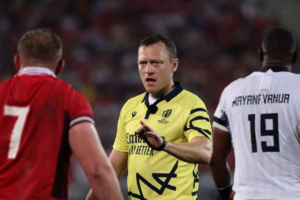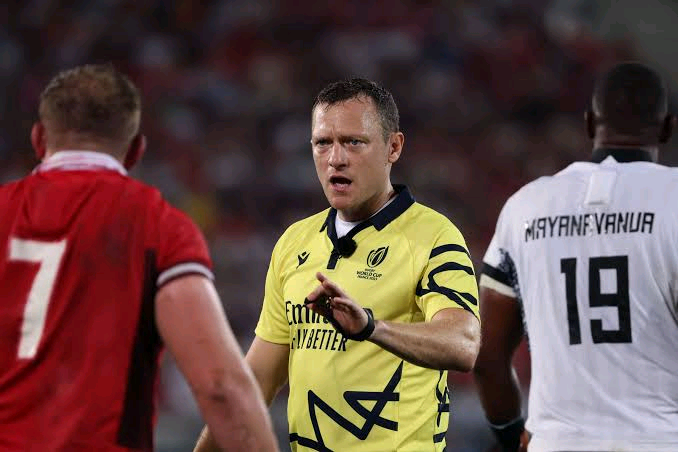BREAKING NEWS:Referee Suspended for Controversial Red Card Decision in the MSG Cup: Fiji’s Victory in Question…
In a shocking turn of events, the match between Fiji and Papua New Guinea in the 2024 Melanesian Spearhead Group (MSG) Cup has sparked controversy following a contentious red card decision that has left the football community reeling. The decision, which many critics believe unfairly tilted the match in favor of Fiji, led to the suspension of the referee involved in the incident. This development has not only brought into question the integrity of the match but has also ignited debate over the role of officiating in international football tournaments.
The Controversial Incident
The drama unfolded during the second half of the tightly contested match between the Bula Boys (Fiji’s national team) and Papua New Guinea. With the score tied at 1-1, the atmosphere was tense as both teams battled for dominance on the pitch. However, the game was turned on its head when the referee handed a straight red card to Papua New Guinea’s defender, Komi Asue, after a challenge on Fiji’s midfielder, Tino Daka.

At first glance, many felt that the tackle, although robust, did not warrant such a severe punishment. Asue had come in with force but appeared to make a legitimate attempt to win the ball, with no malicious intent. However, the referee, whose decision was instant and without hesitation, deemed the challenge dangerous enough to send Asue off. The red card left Papua New Guinea with just 10 players on the field, a numerical disadvantage that ultimately contributed to Fiji securing a 2-1 victory in the match.
The decision quickly sparked outrage from players, coaches, and fans alike. Social media platforms erupted in heated discussions, with many expressing their disbelief and frustration. Papua New Guinea’s head coach, Michael O’Connor, was visibly furious, claiming that the referee’s decision was “game-changing” and “unfair.” He argued that the referee had overreacted to a physical but not reckless challenge, accusing the official of making an error in judgment that compromised the integrity of the match.
Immediate Fallout: Suspension of the Referee
In the aftermath of the match, the controversy surrounding the red card decision continued to dominate the headlines. Refereeing bodies within the Oceania Football Confederation (OFC) launched an internal investigation into the incident. The result was swift and decisive. The referee in question, whose name has not been publicly disclosed due to privacy reasons, was suspended pending further review of their decision-making process.
This suspension has sent shockwaves throughout the football community, highlighting the significance of the officiating decisions in high-stakes tournaments like the MSG Cup. While referees are expected to make split-second decisions in the heat of the moment, the controversy surrounding this red card has raised concerns about the accountability and consistency of officiating in international football.
The OFC, in a statement, acknowledged the gravity of the situation and emphasized that the integrity of the competition must be upheld. “The decision to suspend the referee reflects the seriousness of the situation,” the statement read. “Officiating mistakes can sometimes happen, but in cases where those mistakes affect the outcome of a match, we must take appropriate action to ensure fair play is maintained.”
Fiji’s Victory in Question
While Fiji’s win in the match was officially recognized, the controversial nature of the red card has led many to question the fairness of the result. Some believe that the numerical advantage gained by the Bula Boys played a significant role in their eventual victory, particularly as the match began to open up following the sending off of Asue. The remaining 10 men of Papua New Guinea struggled to contain the attacking prowess of Fiji, who capitalized on the extra player to score the winning goal late in the game.
Despite the protestations from Papua New Guinea, however, Fiji’s victory remains intact. The result has put the team in a favorable position within the tournament, but questions linger about whether the match would have played out differently had the red card not been issued.
For many fans of Papua New Guinea, the decision remains a bitter pill to swallow. “We played a good game until the referee ruined it for us,” said one fan on social media. “We were in control, and that red card changed everything.”
Refereeing Under Scrutiny in the MSG Cup
The controversy surrounding this particular red card incident is not an isolated case in international football. Officiating in major tournaments has often been a point of contention, with several high-profile decisions coming under scrutiny in recent years. The MSG Cup, which serves as a regional competition for the Pacific Islands, is no stranger to such debates. In the past, there have been calls for more transparent and consistent officiating standards, particularly in matches involving smaller nations that sometimes lack the same level of scrutiny and support as larger footballing countries.
Critics argue that the lack of advanced technology, such as Video Assistant Referee (VAR), in tournaments like the MSG Cup can contribute to these errors. Without the aid of such technology, referees are left to rely solely on their judgment, which can be fallible, especially in high-pressure situations. While some argue that referees should be given the benefit of the doubt, others believe that more should be done to prevent such controversial decisions from undermining the credibility of international tournaments.
Looking Ahead: What’s Next for the MSG Cup?
The suspension of the referee is unlikely to be the last word on this issue. The OFC will continue to review its officiating protocols in an effort to avoid similar incidents in the future. For Papua New Guinea, the team must now focus on recovering from the loss and preparing for their next match in the MSG Cup, while Fiji can take some comfort in their hard-fought victory – albeit one tainted by controversy
As for the future of the MSG Cup, questions about officiating standards will continue to hover over the competition. Will there be an increased focus on the training of referees? Will VAR or other technologies be introduced in the future to ensure fairer decision-making? Only time will tell, but the recent events have shown that the integrity of the competition is crucial to maintaining its credibility.
In the end, the MSG Cup’s goal is to celebrate the spirit of football in the Pacific Islands, bringing together nations for the love of the game. However, as this incident has shown, the role of refereeing is vital in ensuring that the competition remains fair,transparent, and free from controversy.









